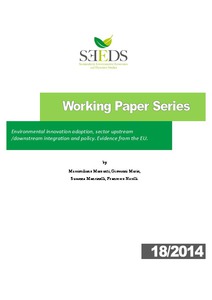Carbon dioxide reducing environmental innovations, sector upstream/downstream integration and policy. Evidence from the EU
"Eco innovations in the climate change realm require pressures and knowledge from outside the firm's and sector's boundaries. The role of policies is well known, as a tool that potentially tackles two externalities: innovation and environmental market failures. Sector integration is a...
| Main Authors: | , , , |
|---|---|
| Institution: | ETUI-European Trade Union Institute |
| Format: | TEXT |
| Language: | English |
| Published: |
Ferrara
2014
SEEDS |
| Subjects: | |
| Online Access: | https://www.labourline.org/KENTIKA-19117884124919350669-Carbon-dioxide-reducing-enviro.htm |
| _version_ | 1771659893704491009 |
|---|---|
| author | Mazzanti, Massimiliano Marin, Giovanni Mancinelli, Susanna Nicolli, Francesco |
| author_facet | Mazzanti, Massimiliano Marin, Giovanni Mancinelli, Susanna Nicolli, Francesco |
| collection | Library items |
| description | "Eco innovations in the climate change realm require pressures and knowledge from outside the firm's and sector's boundaries. The role of policies is well known, as a tool that potentially tackles two externalities: innovation and environmental market failures. Sector integration is also increasingly relevant for understanding the economic, environmental and innovation performances of countries. We integrate these two perspectives to provide evidence on the policy effects behind the adoption of eco innovations in EU sectors. We take a sector perspective by exploiting EU CIS data over 2006-2008. By using past CO2 emission intensity (CO2 on value added) as a proxy of policy stringency, we find that emission intensive sectors are more likely to adopt CO2-related eco-innovations. The aforementioned results are valid for both the economy as a whole and for industrial sectors specifically. We additionally show that not only environmental policies are important to sustain EI adoptions. Other 'external' drivers play a role. Looking at the role of inter sector integration and knowledge sources, we observe that sectors with more emission intensive upstream 'partners' eco-innovate more to reduce their CO2 footprints. The positive and significant effect of upstream emission intensity (supplier's emission intensity) is actually stronger than the effect of 'direct' CO2 emission intensity (policy effect)." |
| format | TEXT |
| geographic | EU countries |
| id | 19117884124919350669_df29321e5879432a805f7cdd87148467 |
| institution | ETUI-European Trade Union Institute |
| is_hierarchy_id | 19117884124919350669_df29321e5879432a805f7cdd87148467 |
| is_hierarchy_title | Carbon dioxide reducing environmental innovations, sector upstream/downstream integration and policy. Evidence from the EU |
| language | English |
| physical | 22 p. Digital |
| publishDate | 2014 |
| publisher | Ferrara SEEDS |
| spellingShingle | Mazzanti, Massimiliano Marin, Giovanni Mancinelli, Susanna Nicolli, Francesco climate change environmental policy industrial sector innovation Carbon dioxide reducing environmental innovations, sector upstream/downstream integration and policy. Evidence from the EU |
| thumbnail | https://www.labourline.org/Image_prev.jpg?Archive=109134692731 |
| title | Carbon dioxide reducing environmental innovations, sector upstream/downstream integration and policy. Evidence from the EU |
| topic | climate change environmental policy industrial sector innovation |
| url | https://www.labourline.org/KENTIKA-19117884124919350669-Carbon-dioxide-reducing-enviro.htm |

